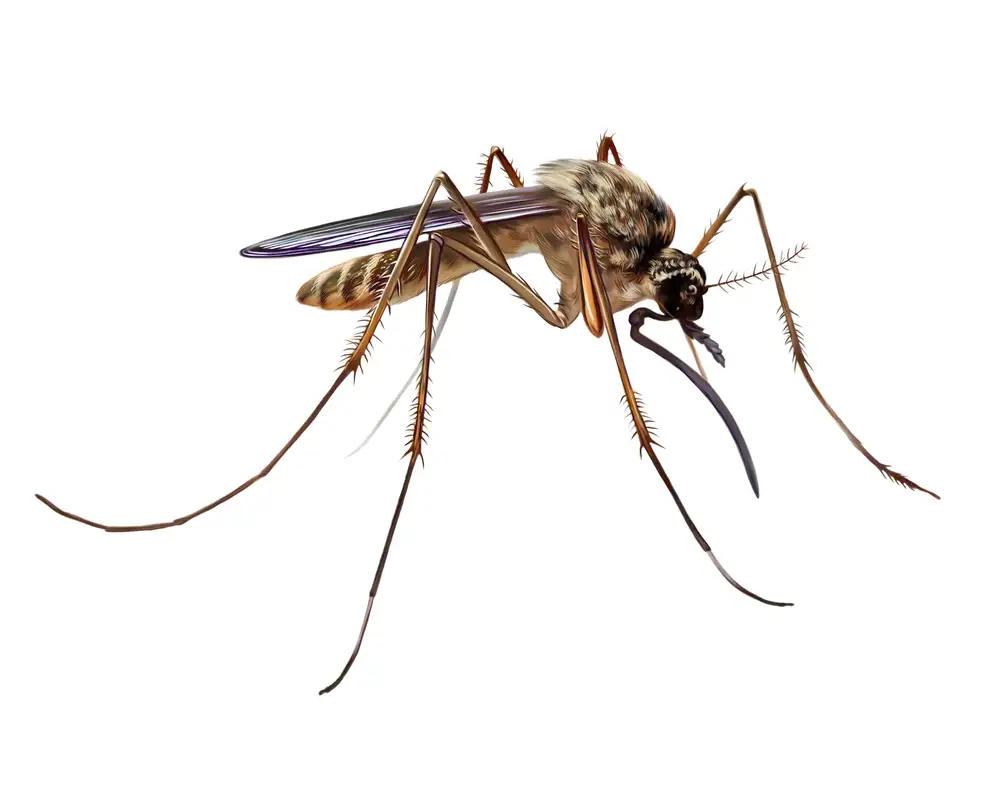The only thing I dislike about warm months is that the mosquitoes come back in full force. If you live in an area where you don’t have them, consider yourself lucky. In my area, they are out day and night.
Mosquito bites aren’t just itchy for dogs—they can lead to serious issues like heartworm disease. Don’t worry, though! I’ve got you covered with the latest tips to keep your pup safe, based on 2025 veterinary guidelines from the American Heartworm Society and other trusted sources.
Let’s dive into how to prevent mosquito bites, spot them, and treat them—plus some myths to bust and FAQs to answer.
Why Mosquito Bites Are Dangerous for Dogs
This is a parasitic condition that is very serious for dogs. The disease is spread by mosquitoes. When an infected dog is bitten, the blood the mosquito ingests may contain heartworm offspring. So, when that same infected mosquito goes and bites another dog, that heartworm offspring passes through.
Once inside a host, heartworm parasites can grow to be up to a foot long and can cause serious damage to the lungs, the arteries, and the heart. Other symptoms of heartworm infection in dogs include lethargy, coughing, vomiting, difficulty breathing, fainting, and exercise intolerance. Yes, all of this can happen from a single insect bite.
The American Heartworm Society estimates over 1 million dogs in the U.S. are affected by heartworm each year, and it’s spread only by infected mosquitoes. Bites can also cause itching, swelling, or even allergic reactions in some pups.
West Nile Virus is another disease that mosquitoes pick up and transmit to your dog. The mosquitoes get West Nile Virus from infected birds. However, an infected dog rarely develops this disease.
How to Prevent Mosquito Bites on Your Dog
Prevention is your best friend when it comes to protecting your dog from mosquitoes. Here are some vet-approved strategies to keep those bloodsuckers at bay:
- Use Vet-Approved Mosquito Repellents: Products like K9 Advantix II or Vectra 3D (containing permethrin) are EPA-approved to repel and kill mosquitoes. Apply them every 30 days, following the label exactly, and always check with your vet first. Avoid human repellents like DEET, which are toxic to dogs. For a natural option, citronella-based sprays can help, but are less effective, so use them as a backup.
- Heartworm Prevention (in case your dog is bitten) is Non-Negotiable: Mosquitoes are the only way heartworm spreads, so year-round prevention is a must, even in cooler months, per AHS guidelines. Popular FDA-approved options include:
*Heartgard Plus (ivermectin/pyrantel): A monthly chewable that’s easy to give.
*Interceptor (milbemycin oxime): Another monthly option that also tackles other parasites.
*ProHeart 6 or 12 (moxidectin): Vet-administered injections lasting 6 or 12 months—great if you forget monthly doses.
*Advantage Multi (moxidectin/imidacloprid): A topical that covers heartworm and fleas. Start puppies as young as 6–8 weeks, and ask your vet which is best for your Chi. Check out Veterinary Partner’s comparison chart for details.
- Avoid Peak Mosquito Hours: Mosquitoes are most active at dawn and dusk, so try to keep your pup indoors during these times. If you’re out for an evening walk, stick to well-lit areas and use a repellent.
- Control Your Environment: Mosquitoes love standing water, so check your yard for puddles, birdbaths, or clogged gutters. Use pet-safe larvicides like Mosquito Dunks in ponds or water features. Bonus: These are eco-friendly and won’t harm your dog or the planet!
- Indoor Protection: Mosquitoes can sneak into your home, so consider dog-safe mosquito screens or air purifiers to reduce indoor bites. Even indoor Chihuahuas need heartworm prevention, as mosquitoes don’t respect doors!
- Explore New Tools: Emerging options like permethrin-impregnated dog beds or clothing can add an extra layer of protection. There are also mosquito traps or ultrasonic devices for yards, though their effectiveness is still being studied.
Pro Tip: Set a reminder to give heartworm preventatives on the 1st of each month, and schedule annual heartworm testing to catch any issues early, even if your dog’s on medication. Or you can do what I do. My dogs get a heartworm preventative shot that lasts every 6 months.
Here are Some Ways to Lessen the Chance of Your Dog Getting bitten by a Mosquito:
- Avoid walking your dog at night or early morning and early evening if possible, as this is the time mosquitoes are most active.
- Avoid walking your dog in marshy areas.
- Plant mint near your doors (it’s a natural insect repellent).
- Change water in your dog’s water bowl every day.
- Make sure there is no stagnant water in your yard.
- Keep a citronella plant or candle near your back door.
- Plant a Eucalyptus tree. They don’t grow very large, and not only do they repel mosquitoes, but they also repel fleas too.
- Make sure the screens in your windows don’t have any holes or tears in them.
- Use an insect vest when walking your dog.
- Use products that prevent/repel mosquito bites.
How to Prevent Mosquito Bites on Your Dog
Prevention is your best friend when it comes to protecting your dog from mosquitoes. Here are some vet-approved strategies to keep those bloodsuckers at bay:
- Use Vet-Approved Mosquito Repellents: Products like K9 Advantix II or Vectra 3D (containing permethrin) are EPA-approved to repel and kill mosquitoes. Apply them every 30 days, following the label exactly, and always check with your vet first. Avoid human repellents like DEET, which are toxic to dogs. For a natural option, citronella-based sprays can help but are less effective, so use them as a backup.
- Heartworm Prevention Is Non-Negotiable: Mosquitoes are the only way heartworm spreads, so year-round prevention is a must, even in cooler months, per AHS guidelines. Popular FDA-approved options include:
- Heartgard Plus (ivermectin/pyrantel): A monthly chewable that’s easy to give.
- Interceptor (milbemycin oxime): Another monthly option that also tackles other parasites.
- ProHeart 6 or 12 (moxidectin): Vet-administered injections lasting 6 or 12 months—great if you forget monthly doses.
- Advantage Multi (moxidectin/imidacloprid): A topical that covers heartworm and fleas. Start puppies as young as 6–8 weeks, and ask your vet which is best for your Chi. Check out Veterinary Partner’s comparison chart for details.
- Avoid Peak Mosquito Hours: Mosquitoes are most active at dawn and dusk, so try to keep your pup indoors during these times. If you’re out for an evening walk, stick to well-lit areas and use a repellent.
- Control Your Environment: Mosquitoes love standing water, so check your yard for puddles, birdbaths, or clogged gutters. Use pet-safe larvicides like Mosquito Dunks in ponds or water features. Bonus: These are eco-friendly and won’t harm your dog or the planet!
- Indoor Protection: Mosquitoes can sneak into your home, so consider dog-safe mosquito screens or air purifiers to reduce indoor bites. Even indoor Chihuahuas need heartworm prevention, as mosquitoes don’t respect doors!
- Explore New Tools: Emerging options like permethrin-impregnated dog beds or clothing can add an extra layer of protection. There are also mosquito traps or ultrasonic devices for yards, though their effectiveness for dogs is still being studied. Always run these by your vet.
Pro Tip: Set a reminder to give heartworm preventatives on the 1st of each month, and schedule annual heartworm testing to catch any issues early, even if your dog’s on medication.
How to Spot Mosquito Bites on Your Dog
Mosquito bites on dogs look like small, red bumps, often on less furry areas like the belly, ears, or nose. Your Chi might be scratching, licking, or chewing at the spot, and you may notice mild swelling or redness. Here’s what to watch for:
- Common Signs: Itchy red bumps, mild swelling, or excessive scratching.
- Allergic Reactions: Some dogs are allergic to mosquito bites, leading to hives, intense itching, or, in rare cases, severe symptoms like facial swelling or trouble breathing. Call your vet immediately if you see these.
- Heartworm Symptoms: If an infected mosquito bites your dog, heartworm disease can develop over months, causing coughing, lethargy, or difficulty breathing. This is why annual testing is crucial.
- Secondary Infections: Scratching can lead to bacterial infections, with signs like pus, odor, or worsening redness.
If you’re unsure whether it’s a mosquito bite or another skin issue (like fleas or allergies), snap a photo and consult your vet. You can also use veterinary telemedicine for quick advice on minor issues.
Treating Mosquito Bites on Your Dog
Most mosquito bites heal on their own within a few days, but you can help your Chi feel better and prevent complications. Here’s how, based on PetMD and AVMA recommendations:
- Clean the Area: Gently wash the bite with mild soap and water to prevent infection. Pat dry with a clean towel.
- Soothe the Itch: For mild irritation, apply pet-safe aloe vera (non-toxic, vet-approved) or a chamomile compress to calm the skin. Avoid human lotions or unverified home remedies.
- Prevent Scratching: If your dog just won’t stop scratching, use an inflatable donut collar or a lightweight dog shirt to stop your pup from scratching, which can lead to infections.
- Antihistamines (Vet-Approved Only): If itching is severe, your vet may recommend diphenhydramine (Benadryl) at 1 mg per pound of body weight, given twice daily. For a 10-pound Chi, that’s about 10 mg, but always confirm with your vet. Never use human medications with additives like xylitol, which is toxic to dogs.
- Watch for Complications: If you see signs of infection (pus, odor, worsening redness) or allergic reactions (swelling, breathing issues), get to the vet ASAP. Severe cases may need antibiotics or steroids.
- Heartworm Concerns: If your dog isn’t on prevention and you suspect heartworm (e.g., coughing, lethargy), schedule a vet visit for testing. Treatment involves doxycycline and melarsomine injections, costing $1,000–$2,000, so prevention is way easier (and cheaper!).
Pro Tip: Keep a pet first-aid kit with vet-approved supplies like antiseptic wipes and a cone or inflatable donut collar for quick bite management.
Here are Some More Ways to Stop the Itch After You or Your Dog is Bitten by a Mosquito:
- Wipe the area with a little rubbing alcohol. It seems to stop the itch.
- I have also dabbed bites with coconut oil, which healed it quickly and took away the itch.
- I haven’t tried this, but have heard that Preparation H helps relieve the itch– be mindful that your dog cannot lick this product.
- If you are growing Basil in your garden, pick off a leaf and rub the bite with it.
Regional and Seasonal Considerations
Mosquito risks vary by location and season. The southeastern U.S., Gulf Coast, and areas near standing water are heartworm hotspots, per AHS incidence maps.
Warmer climates mean longer mosquito seasons, and climate change is making things worse by extending mosquito activity into fall or even winter in some areas.
Check your local risk at heartwormsociety.org and adjust your prevention plan accordingly. For example, if you’re in Florida, year-round vigilance is a must, while northern states may see peak risk in spring and summer.
Myths vs. Facts About Mosquito Bites and Dogs
Let’s clear up some common misconceptions:
- Myth: Indoor dogs don’t need heartworm prevention.
Fact: Mosquitoes can sneak indoors, so every dog needs year-round protection. - Myth: Mosquitoes only bite at night.
Fact: Some species, like Aedes mosquitoes, are active during the day, so don’t let your guard down. - Myth: All mosquito bites cause heartworm.
Fact: Only bites from infected mosquitoes transmit heartworm, but all bites can cause irritation or allergies. - Myth: Human repellents are safe for dogs.
Fact: Products like DEET can be toxic to dogs. Stick to vet-approved options like K9 Advantix II.
FAQs About Mosquito Bites and Dogs
Q: Can my dog get diseases like Zika or West Nile from mosquitoes?
A: Heartworm is the main mosquito-borne disease for dogs. West Nile is rare in dogs, and Zika isn’t a significant risk. Focus on heartworm prevention.
Q: How soon should puppies start heartworm prevention?
A: Puppies can start as early as 6–8 weeks, per AHS guidelines. Talk to your vet about the best product for your Chi.
Q: Are natural repellents effective?
A: Citronella or essential oil sprays may help, but are less reliable than vet-approved products like Vectra 3D. Always check with your vet.
Q: What if my dog is diagnosed with heartworm?
A: Treatment is costly and complex, involving doxycycline and melarsomine injections. Prevention is much easier!
Your Dog’s Mosquito Protection Plan
Mosquitoes don’t stand a chance if you stay proactive. Schedule a vet visit to discuss heartworm preventatives and repellents tailored to your Chi’s needs.
Share your own mosquito-fighting tips in the comments below. I’d love to hear how you keep your pup safe! For more resources, check out heartwormsociety.org or avma.org. Let’s keep those tails wagging, bite-free!

Paula Simons
DVM
This article has been reviewed, fact-checked, and approved by Dr. Paula Simons DVM. You can read more about her on our About page.






